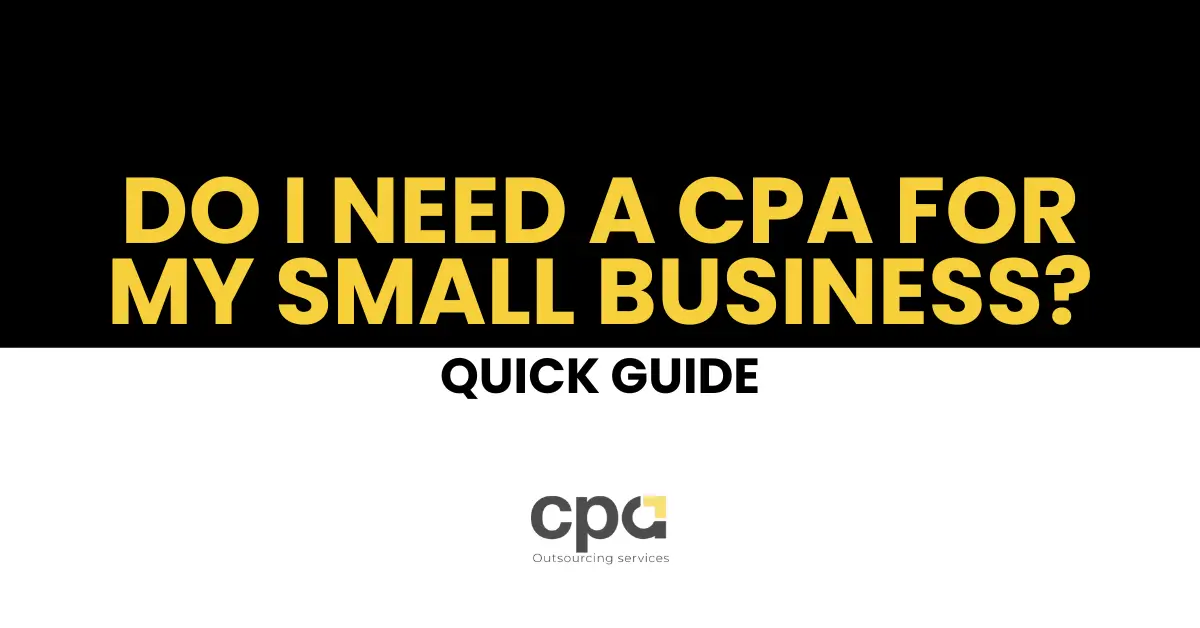Do I Need a CPA for My Small Business?

Running a small business means making tough calls every day — what to spend on, what to skip, and when to bring in outside help. One of the most common decisions business owners’ wrestles with is whether or not to hire a Certified Public Accountant (CPA).
At first glance, doing your own bookkeeping might feel manageable. Maybe you’re using software like QuickBooks, staying on top of invoices, and filing taxes through online tools. But as your business starts to grow — even modestly — things get more complicated.
A new hire. A contractor in another state. A client who pays late. A surprise letter from the IRS.
And suddenly, financial management stops being a side task — it becomes a risk.
That’s where a CPA can make a real difference.
Why Many Small Businesses Wait Too Long to Hire a CPA
Most small businesses don’t hire a CPA because they think they’re not “big enough yet.” But that’s often when they need one the most. Early-stage financial decisions have long-term impact — from how you pay yourself to how your business is taxed.
And it’s not just about tax season.
A good CPA helps you understand your cash flow, avoid penalties, choose the right entity structure, and plan for growth. They don’t just file forms — they help you see around corners financially.
One of the top reasons to hire a CPA is this: they can often save you far more than they cost — in both money and stress.
“I thought hiring a CPA was overkill,” said Maria, a freelance web designer from Atlanta.
“But I was underreporting income by mistake, overpaying in taxes, and missing deductions. My CPA fixed it all — and I ended up getting a refund.”
Hiring a CPA isn’t an admission that you can’t handle your finances. It’s a strategic move — like hiring a lawyer or a marketing expert — when the stakes are too high to rely on guesswork.
What a CPA Actually Does — Beyond Taxes
Many people think of CPAs as people you see once a year to help file your taxes. And yes — they do that. But their value goes far beyond tax season.
Here’s what a great CPA can help you with:
- Entity selection and formation: Choosing between an LLC, S corp, C corp, or sole proprietorship can have huge tax and liability implications.
- Tax planning: Not just filing returns, but planning quarterly payments, maximizing deductions, and reducing liabilities.
- Bookkeeping and compliance: Keeping your financials clean and audit-ready.
- Budgeting and forecasting: Helping you make smarter business decisions using real data.
- Advising on big moves: Expanding, buying equipment, hiring — they help you weigh the financial risks and rewards.
When Hiring a CPA Makes Sense
You don’t need to be running a $10 million company to justify bringing in a CPA. In fact, there are several inflection points where hiring one makes a lot of sense:
1. You’re growing faster than expected
If you’ve suddenly taken on more clients or started earning more revenue, it’s a good time to get professional oversight.
2. You’re hiring employees or working with contractors
Payroll taxes, benefits, and compliance laws vary by state. CPAs can make sure you stay compliant and efficient.
3. You’ve received outside funding
Investors expect clean, GAAP-compliant financials. A CPA helps you deliver those confidently.
4. You want to avoid costly mistakes
Financial errors — especially tax-related — can cost thousands. A CPA is your first line of defense.
The Cost Factor — and What You Get in Return
Yes, CPAs charge more than software. But you’re paying for peace of mind, legal compliance, and strategic guidance.
The cost for small businesses typically ranges from $150 to $400 per hour, depending on complexity.
However, many CPAs offer monthly or quarterly packages for small businesses, which can be more affordable long-term.
And consider this: what’s the cost of making a $10,000 tax error? Or missing a filing deadline and getting hit with penalties?
Hiring a CPA isn’t an expense — it’s an investment in your business’s health and scalability.
Signs You’re Not Ready Yet — And That’s Okay
If you’re still pre-revenue, with only a few transactions a month, and no employees, you might not need a CPA just yet.
In those early stages, you can rely on basic accounting tools, templates, and part-time bookkeepers.
But stay alert for signs that it’s time to upgrade: feeling overwhelmed by tax prep, not knowing how much profit you actually make, or getting letters from the IRS you don’t fully understand.
The moment you start feeling like you’re guessing — that’s the moment a CPA can add real value.
Conclusion
So, do you need a CPA for your small business? Not every business needs one on day one — but as things grow, get messy, or become more regulated, having a trusted advisor by your side can be the difference between running blind and running smart.
Whether it’s tax planning, cash flow guidance, or strategic decision-making, a CPA offers more than number-crunching. They offer clarity — and in business, that’s invaluable.
Thinking about taking that step? Start by talking to a few local CPAs. Ask what they can offer, and how they work with small businesses.
Even one conversation might shift the way you see your business finances.
Because in the end, a great CPA doesn’t just help you stay compliant — they help you build something that lasts.
